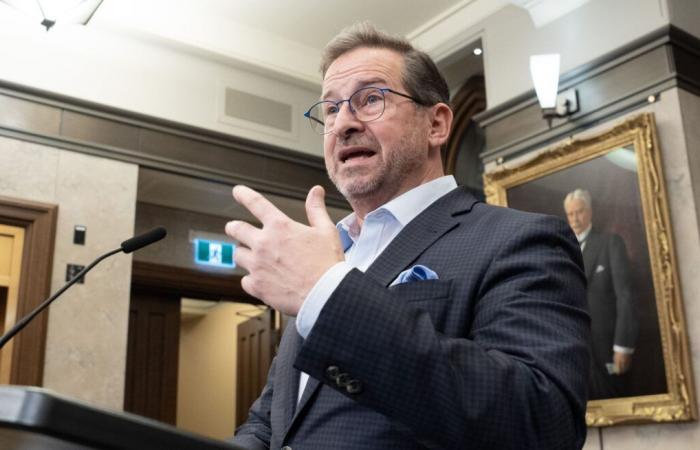
Canada is playing with fire when it raises the idea of cutting off electricity or oil supplies in response to the threat of tariffs from US President Donald Trump, judges the leader of the Bloc Québécois, Yves-François Blanchet.
It’s a “crazy” idea, […] a rant that is not justified,” he said in an interview with The Canadian Presson the sidelines of Mr. Trump’s return to the White House on Monday. According to him, Canada must respond to tariffs with tariffs.
“If you break the habit of supplying Americans with energy from Quebec and Canada, once they find other sources of supply, you will be in a very disadvantageous position. to negotiate new contracts. In the long term, it’s a bit of a scorched earth policy,” he insisted.
He also notes that the supply of oil possibly constitutes “a national security issue” for the Americans and that that coming from Canada is “a bit theirs since it is in their backyard”, which makes the rhetoric of much less “judicious”.
Mr. Blanchet thus adopts a position opposite to that of the Prime Minister of Quebec, François Legault, that of Canada, Justin Trudeau, and almost all of the provinces, wanting that “everything is on the table” in this negotiation.
Conversely, he seems to align with that of Alberta Prime Minister Danielle Smith, who does not intend to support the “Team Canada” approach if energy exports are likely to be part of the government’s response federal.
Lower your voice
Mr. Blanchet, who nevertheless judges that Canada should respond to the imposition of tariffs, believes that it is necessary to avoid the use of certain words such as “retaliation” or even “trade war”, terms that the chief diplomat of the country, Mélanie Joly, regularly used it last week in Washington just as Prime Minister Legault did Monday evening, after the interview.
“This is not how we bring together the conditions to negotiate properly,” he sent. American negotiators will not negotiate with fists on the table. They will eventually negotiate rationally. This will be the reason that will prevail. »
Currently, deplores Mr. Blanchet, “the tone is bravado”. The federal Liberals, in the middle of the leadership race, are stepping up to present themselves as the candidate best placed to face Mr. Trump, and the Premier of Ontario, Doug Ford, is taking on the appearance of “Captain Canada” possibly in the role. eve of the start of an electoral campaign in his province.
“It’s as if we are trying to score points in domestic politics rather than managing a crisis which is of a commercial and economic nature,” he summarized.
Mr. Blanchet affirmed that Quebec “has no choice” to play with “Team Canada” given that Washington will not negotiate with a province.
He also judges that former Prime Minister of Canada Jean Chrétien “distorted the facts, as […] so often in his career”, when he rejoiced in his final days that even the Bloc was defending Canada. “Quebec would do much better if it were an independent country,” insisted the Bloc leader.
The province can, however, make its own representations. Mr. Blanchet himself is planning a mission to the southern neighbors in March to discuss aluminum, wood, supply management, the cultural sector and aeronautics with elected officials, groups pressure groups and think tanks.
He also believes that Mr. Trudeau’s appointment of former Quebec Prime Minister Jean Charest to the advisory committee on Canadian-American relations “is very good, (but) it is not enough.”
-The weight of Quebec within this group should, he believes, be comparable to that which it occupies within the Canadian economy. Mr. Blanchet submits, in this regard, the name of another former Prime Minister of Quebec, Pierre Marc Johnson, who has “remarkable expertise” in this type of negotiations.
Election pre-campaign
Mr. Blanchet, who is bringing his caucus together in Laval on Tuesday for a meeting and a tour of the region, believes that it is nothing more and nothing less than the launch of the Bloc’s electoral pre-campaign, while elections will likely be called immediately. here at most ten weeks for the resumption of parliamentary work.
So, in the coming weeks, Mr. Blanchet intends to go on an imposing tour that will take him to the four corners of Quebec.
And this tour begins in Laval, an island on which the Bloc judges that “for the first time in a long time” it could be able to win over constituencies.
“Yes, there are regions that are targeted,” he admitted as he carefully examined the map of Quebec, giving the impression of constantly putting pins here and there.
The Bloc feels that it has the wind in its sails by observing its continued advance in voting intentions. “We are in expansion mode,” sums up those around Mr. Blanchet.
The Bloc leader will travel to the Quebec region, where his team believes it can win 10 of the 12 ridings, notably that of Minister Jean-Yves Duclos (Quebec) and Liberal MP Joël Lightbound (Louis-Hébert).
He also plans to hunt in conservative lands. Gérard Deltell (Louis-Saint-Laurent) and Pierre Paul-Hus (Charlesbourg — Haute-Saint-Charles), should, it seems, hold on.
Electoral redistribution would even change the situation in the riding which includes Rivière-du-Loup where the conservative Bernard Généreux was solid.
In Estrie, thanks to the collapse of the Liberals, Mr. Blanchet believes that his troops could take the entire region.
In his sights, he also has Chicoutimi — Le Fjord, currently represented by the conservatives, but also Argenteuil — La Petite-Nation, Longueuil — Charles-LeMoyne, Châteauguay — Lacolle, all liberal ridings.
Mr. Blanchet indicated that he will deploy “a lot” of energy on the island of Montreal. The Bloc will try to take a good number of ridings in the east and center, including, to name a few, that of Minister Steven Guilbeault, on the Plateau (Laurier — Sainte-Marie), that of the deputy leader neo-democrat, Alexandre Boulerice, whose popularity is driven from below by his party (Rosemont — La Petite-Patrie) or even that of the hitherto “undismissable” Prime Minister Justin Trudeau (Papineau).
Her team affirmed that it is “not at all” on the defensive in the ridings of Mario Simard (Jonquière), Julie Vignola (Beauport — Limoilou) and Caroline Desbiens (Beauport — Côte-de-Beaupré — Île d’Orléans — Charlevoix).




